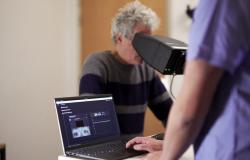Health –
Alzheimer’s disease, information for your eyes
Different means exist to reduce the risks or delay the appearance of Alzheimer’s symptoms. Including taking care of your eyesight.
The first symptoms of Alzheimer’s may be visual disturbances.
Richard Drury/Getty Images
Subscribe now and enjoy the audio playback feature.
BotTalk
- Experts emphasize the importance of preventing dementia.
- Risk factors include high cholesterol and vision problems.
- Preventative interventions can reduce the risk of Alzheimer’s, even with genetic predisposition.
- The “Lancet” report proposes individual and collective actions for prevention.
Move more, eat healthily, sleep well, stop smoking: these prevention tips are repeated so often that we no longer pay much attention to them. However, they are relevant for reducing the risk of numerous problems and are also valid for preventing Alzheimer’s disease and related pathologies, as noted by the international experts meeting within the Commission on Dementias of the medical journal “The Lancet” in their updating of data and recommendations on the subject. An update full of discoveries.
Thus, untreated vision problems and a high level of “bad” cholesterol (LDL) are now added to the list of modifiable risk factors. These are of different types: biological and medical (head injuries, high blood pressure, diabetes, obesity, depression, hearing loss), behavioral (consumption of alcohol, tobacco, lack of physical activity or sleep), social ( low level of education, reduced social interactions) and environmental (air pollution).
All these parameters are responsible for around 45% of cases of dementia and, for the first time, specialists announce that it is possible to intervene in order to reduce the risks, even in people who have a genetic predisposition to dementia. Alzheimer’s disease.
“Prevention is of much greater importance than we imagined when neurodegenerative diseases were discovered. We understand better and better what parameters can increase the probability of developing these diseases and how to act on them, which is very positive, notes P.r Gilles Allali, director of the Leenaards Center for Memory at the Vaud University Hospital (CHUV). This also helps to take a different look at these diseases. And as access to therapeutic innovations remains limited in Switzerland, prevention is all the more important. Information must therefore be widely circulated on this subject.”
The role of sight
Stimulating the body and the brain as much as possible and as widely as possible is the challenge. It is therefore not surprising that vision has crept into the risk factors to be taken into account. “A reduction in the stimuli that reach the brain, in the case of hearing or vision disorders for example, will have an impact on it and can reveal or accelerate the development of a neurodegenerative disease,” explains P.re Aki Kawasaki, associate physician, head of the Neuro-Ophthalmology Unit at the Jules-Gonin Ophthalmic Hospital, in Lausanne.
Several studies have shown that patients with Alzheimer’s disease are more prone to cataracts and age-related macular degeneration (AMD) than others. “It is not yet known whether these eye diseases could predict the later occurrence of Alzheimer’s disease, moderates the Pre Kawasaki. On the other hand, we know that sometimes the first symptoms can be visual disturbances. This is the case when posterior cortical atrophy, also called Benson syndrome, is present. The signs are not very specific, patients report that screens bother them or that they cannot see well. Different tests and precise questioning allow us to clarify the diagnosis.”
Amyloid, a protein whose accumulation in nerve cells is typical of Alzheimer’s, can also be deposited in the retina, an eye tissue that is part of the nervous system. Research is underway to determine whether, using medical imaging, it would be possible to study the retina to identify amyloid deposits early.
Never too early
Adapting your lifestyle at age 35 to delay the onset of a neurodegenerative disease at age 75 or 80 is far from obvious. However, it’s never too early to take care of your brain. “It is between the ages of 30 and 60 that we prepare for old age,” insists Fr.r Allali. The “Lancet” experts have classified the main risk factors according to the ages of life at which interventions can be beneficial and they too emphasize that “environmental interventions are particularly important”. This is when we should take stock and think about taking charge of what can be done!
It is important that prevention is associated with the notion of pleasure and, as much as possible, that it allows for the creation of a bond. Has physical activity, for example, never tempted you? What if you took up tango or salsa? “In addition to moving, dancing helps develop coordination, and it is a social activity,” encourages Yasmina Konow, specialist nurse from the Alzheimer Switzerland association. Playing music, singing, speaking or learning a foreign language have also been shown to strengthen cognition.”
IN COLLABORATION WITH PLANETE SANTÉ
The importance of holistic approaches
It is never too late to act: “All prevention measures remain valid for people in whom the disease has already occurred. The interventions have a positive impact on its progression and make it possible to maintain a better quality of life,” explains Yasmina Konow, specialist nurse from the Alzheimer Switzerland association, who is mobilizing for this support.
Another example: the CareMENS program, initially developed at the CHUV and now present in all cantons, has demonstrated the benefit of offering a “cocktail” of activities to people whose neurodegenerative disease is beginning. “Doing sudokus is good, but just doing that doesn’t necessarily have an effect,” smiles Fr.r Gilles Allali, director of the Leenaards Memory Center at CHUV. What is effective, however, are approaches like CareMENS, which are global and where everything is organized for the patient.”
Place for advice
In its 2024 report, the “Lancet”* Commission on Dementia proposes actions to be implemented, at an individual but also collective level, to fight against neurodegenerative diseases. Here is the summary:
– Facilitate access to quality education and encourage stimulating cognitive activities.
– Make hearing aids more accessible and reduce exposure to harmful noise.
– Effectively treat depression.
– Encourage the use of helmets and head protection in contact sports.
– Encourage physical activity.
– Reduce smoking.
– Fight against high blood pressure.
– Monitor your cholesterol.
– Treat obesity as early as possible, which also helps prevent diabetes.
– Reduce alcohol consumption.
– Reduce the social isolation of older people.
– Promote the detection and treatment of vision loss.
– Reduce air pollution.
* «Dementia prevention, intervention, and care: 2024 report of «The Lancet» standing Commission Livingston», Gill et al., «The Lancet», Volume 404, Issue 10452, 572 – 628
“Latest news”
Want to stay on top of the news? “24 Heures” offers you two appointments per day, directly in your email box. So you don’t miss anything that’s happening in your Canton, in Switzerland or around the world.
Other newsletters
Log in
Did you find an error? Please report it to us.
0 comments






